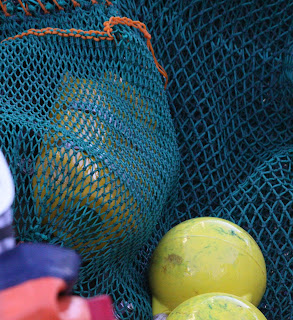We hope your weekend
has been more relaxing than ours. We were lucky with the weather but
tomorrow it will be a different story.
Today is
electronic’s day. I never discuss it here but it is essential to
us. All pictures are taken on board R.V Vizconde de Eza, which
belongs to the Spanish Directorate of Fisheries (Secretaría General
de Pesca). I will be brief because the day was long and frankly
speaking electronics are not my field of expertise.
Let’s
start with the AIS or Automatic Identification System. It’s like a
radar and there are two in the bridge, with different antennas just
in case. They reach 20 nm but
we can reduce it. They can also calculate the time and / or distance
to other ships or obstacles. If it is a ship, we can see its name and
size.
 |
| AIS. R.V. Vizconde de Eza. Secretaría General de Pesca. |
The
GMDSS (Global Marine Distress Safety System) is another essential
piece of equipment. It involves protocols and equipment for safety at
sea. The picture shows only part of them. Up right is the NAVTEX, an
international automated service for direct printing of information
such as weather forecasts, navigational, etc. Below the NAVTEX there
is a fax, no mistery there, and below there is the
radiotelephony equipment, four neat transmitters and receivers. Below
them are the standard C terminals to receive and send messages
throught the INMARSAT satellite network, which allows voice and fax
communication between ships and between ships and land, as well as
weather forecast information, alerts and data transfer. They are the
main component of the GMDSS.
 |
| GMDSS. R.V. Vizconde de Eza. Secretaría General de Pesca. |
The
stern console is the place from which fishing is done. The screens
show the bottom cartography for our study area, done on board R.V
Miguel Oliver, also
belonging to the Spanish Directorate of Fisheries within the frame of
NEREIDA project. The screen in the middle shows old hauls where we
are, and our current position, along with basic bathymetry
information. The screen to the right shows the view from the security
camera behind the net drum.
From
left to right you can see the controller for the engine, to adjust the
speed. Above it there is a clinometer, and a compass. The larger
panel, below, controls the winches for the bottom gear, the cable to
be paid and what has been shot, as well as the power and other basic
information (r.p.m., voltage and God knows what. Above this largest
panel there are a further three. The one on the left is also for the
cable, the other two control the winches for the dredge and the
sonar, neither used in this survey.
 |
| The stern console. R.V. Vizconde de Eza. Secretaría General de Pesca. |
We
have sensors in the trawl and otter doors (red, to the stern). You
can see them if you look well. There
is a hold for it in the middle of the door, and you can make out the
yellow carcass. The other sensor is on the floats line, in the mouth
of the trawl. In the picture it looks like it is badly entangled, but
far from it. The deckhands fix it and detach it from the trawl at
every haul. After the last haul it is brought up to the bridge to
charge the battery.
 |
| Otter board with sensor (yellow). R.V. Vizconde de Eza. Secretaría General de Pesca. |
 |
| The trawl sensor seen behind the net. R.V. Vizconde de Eza. Secretaría General de Pesca.
|
The
information collected by the sensors can be seen in two further
screens, one for the sensors in the otter boards and the other for
the sensor in the trawl.
Finally,
there is an echosounder to show us the profile and depth of the
bottom:
 |
| Depth on the top, profile of the seabed on the bottom. R.V. Vizconde de Eza. Secretaría General de Pesca.
|
… and
my work space in the bridge. Now there is hardly anything but I must say
the Captain and Officers show endless patience with all the stuff I
bring with me. Cables, chargers, hard drives, cameras, lenses,
notebooks… stuff that needs space to be stored. But it is no
problem, I quickly get some drawer space to keep my “toys” so I
don’t have to run constantly between the bridge and my cabin.
 |
| Here I am... R.V. Vizconde de Eza. Secretaría General de Pesca.
|


Veo que estais muy bien preparados tecnològicament para la navegación y la seguridad.Enhorabuena
ResponderEliminarVeo que estais muy bien preparados tecnològicament para la navegación y la seguridad.Enhorabuena
ResponderEliminar